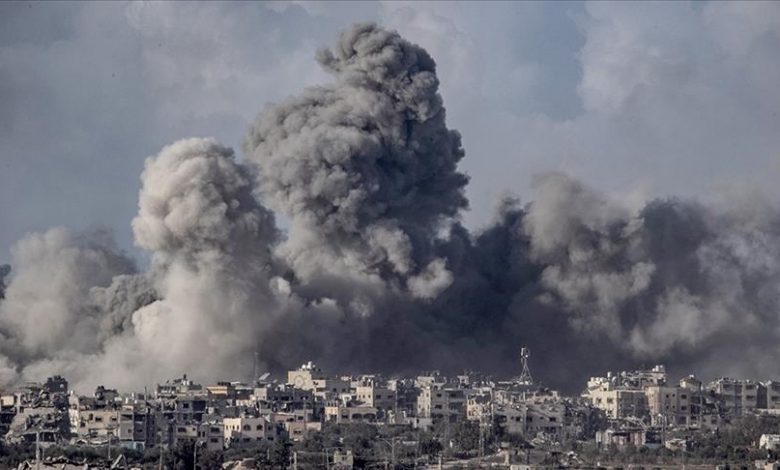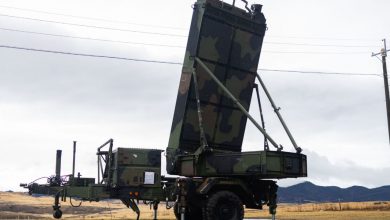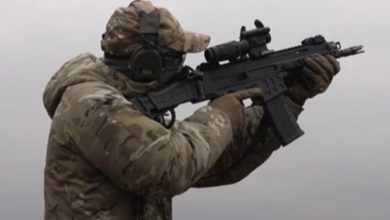Analysis: Solution for Palestine should be sought at International Court of Justice, not International Criminal Court

Chief ICC Prosecutor Karim Khan’s recent statement that he paid last visit to Israel at the request of Israeli families affected by Hamas attacks indicates that this institution is not impartial.
Following Oct. 7, Israel’s systematic attacks on Palestinians continue unabated.
Aggressive statements by Israeli politicians and soldiers accompany the killing of civilians as well as bombing of public spaces such as evacuation routes, hospitals, or schools.
The international community is deliberating how to halt Israel’s actions. Two main approaches are apparent: First, a cease-fire resolution at the UN, and second, launching investigations into war crimes, crimes against humanity, and genocidal crimes, falling under international criminal law.
The UN Security Council is being considered for a cease-fire, while the International Criminal Court (ICC) is being discussed to hold those responsible for the war crimes. Due to the perceived ineffectiveness of the Security Council in light of recent US actions, the idea of prosecuting the perpetrators at the ICC is getting more attention. While the International Court of Justice (ICJ) is a less-discussed option, seeking its intervention could potentially offer a more effective solution.
Could the UN Security Council achieve a cease-fire?
During the over two months of Israeli aggression, international organizations have not taken action to reach a cease-fire for various reasons. The Security Council stands out theoretically with almost unlimited intervention authority. The council can take precautionary or advisory decisions, as well as authorize various states for military intervention to prevent ongoing Israeli attacks. However, due to the US stance, it seems unlikely that these options for resolution will be practically realized. The most recent cease-fire resolution vote, which was held after UN Secretary-General Antonio Guterres sent a letter to the council, was recently vetoed by the US. As long as the US stance persists, the Security Council is unlikely to end the current conflict.
Could the ICC provide a solution for punishment?
Although the terms of the three crimes mentioned above are often used interchangeably, there are significant differences. Legislation regarding war crimes aims to protect individuals and public spaces such as hospitals or schools that serve individuals within the conditions of war.
Crimes against humanity focus on crimes directly committed against civilian individuals without limitations related to the start and end of armed conflicts. The prohibition of genocide, the most severe crime in international criminal law, aims to preserve the existence of a group with distinctive national, ethnic, racial, or religious characteristics, rather than individuals.
Despite the various differences among the elements of these crimes, the ICC is authorized to prosecute individuals for these offenses according to the Rome Statute.
Even before Hamas’ Operation Al-Aqsa Flood, various civil society organizations or research groups considered Israel’s actions within the scope of war crimes and crimes against humanity. Investigations into genocide suggested that Israel’s actions could be considered actions leading to genocide, often described as “slow genocide” or the “beginning of genocide.” Currently, Israel’s actions are widely considered genocide in the international public. The ICC has the authority to prosecute individuals for these crimes.
However, when looked at from a perspective focused on a quick resolution, the ICC does not appear to be the correct avenue. It is essential to note that the ICC has the authority to prosecute only individuals, so it is not possible to stop the ongoing Israeli attacks through all state organs with this court. Additionally, the ICC cannot issue an injunction. Therefore, it is unlikely that the court can promptly stop the current armed conflict with an injunction. The lengthy nature of the trial process is also evident. Despite intense pressure from Western states, the ICC was able to issue an arrest warrant for Russian President Vladimir Putin only about a year after the start of the investigation. A similar process for Israeli officials would likely take years. Finally, even if an arrest warrant were issued for Israeli officials, it seems challenging for these arrests to be carried out in practice.
In addition to these factors, the statement made by ICC Prosecutor Karim Ahmad Khan after his visit to Israel last week further indicates the bias and passivity of this institution. He stressed that he made the visit at the request of Israeli families affected by Hamas attacks and highlighted that Hamas members could be prosecuted by the ICC for these actions. Another interesting statement by the prosecutor is that Israel has experts in international humanitarian law who support the Israeli soldiers. Moreover, Khan did not visit Gaza during the war. Due to all these reasons, the ICC does not appear to be the right choice for producing quick results.
ICJ can provide the most quick, effective solution
The International Court of Justice, the principal judicial organ of the UN, can quickly ensure the cessation of Israel’s aggressive actions or the beginning of a cease-fire process. A submission to the ICJ seems to be a more effective route than the Security Council or the ICC. Through a quick decision, the ICJ can register Israel’s actions as violations of the Genocide Convention, and consequently, provisional measures can be taken to stop these actions. Moreover, the court can bring Israel’s actions to a legally accountable platform.
The ICJ will initiate new discussions on the Israel-Palestine issue starting next year. In December 2022 the UN General Assembly requested an advisory opinion from the ICJ regarding the status of occupied East Jerusalem and the legal consequences of Israel’s occupation. This October, it was announced that the ICJ would hold its first meeting on this issue in February 2024. In those upcoming discussions, the ICJ will issue a consultative opinion on the situation of Jerusalem and the legal consequences of Israeli occupation and violating the right of Palestinians to self-determination.
In conclusion, a decision on this issue should not be expected as the latest developments in Gaza are not within the scope of the current investigation. After a new application to the UN, the General Assembly can forward the request to the ICJ in the same manner. The court has the right to determine interim measures to protect one of the parties. In addition, as explicitly regulated by Article 9 of the 1948 Genocide Convention, to which Israel is also a party, the ICJ is competent in disputes concerning the interpretation or application of the convention or the direct determination of genocide actions. According to Article 35 of the ICJ Statute, the court can decide on damage or compensation due to an act contrary to international obligations. In this context, the court’s role may extend beyond the trial of individuals, having an impact on preventing Israel from carrying out systematic attacks through the state apparatus. Moreover, the court’s evaluation in this direction could contribute to the trial of individuals at the ICC since the relationships between the two institutions are clearly defined by agreements. Since Israel’s non-compliance with the court’s decisions would have more severe consequences, an application against Israel for the Gaza attacks could lead to effective results within a short time.
Source: AA / Translated by Zehra Nur Duz in Ankara.





